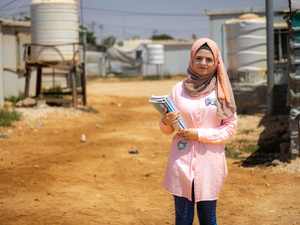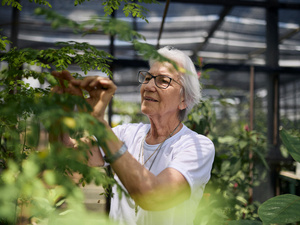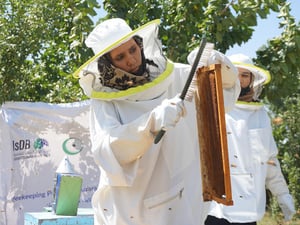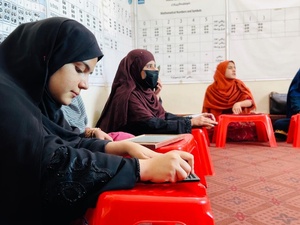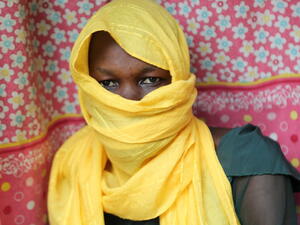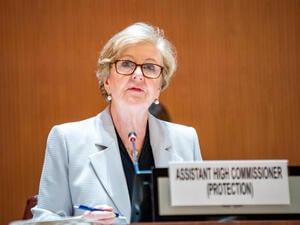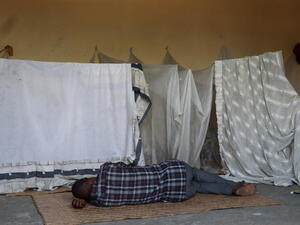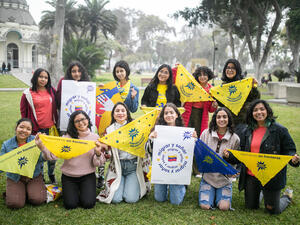Rohingya refugee women raise their voices in Bangladesh

Rohingya refugee women raise their voices in Bangladesh
In a packed meeting room at the Camp-in-Charge’s office, Rohingya refugee Tansima* raises her hand to speak up for her community.
“We need more street lights,” says Tansima, 28, who is an elected deputy bloc leader at the world’s largest refugee settlement, which is home to 620,000 people, more than half of them women or girls.
“It will make it easier to access latrines and shops will be able to stay open after dark,” she adds.
Denied a voice or even basic rights in her native Myanmar, Tansima is among a growing number of Rohingya refugee women who take on key roles ranging from elected community representatives, to teachers and even road builders and firefighters in Bangladesh.
“We are the voices of our community, speaking on their behalf."
Elected by neighbours in her bloc of the sprawling camp, the mother of three children, meets regularly with residents to hear their concerns ranging from access to aid distributions, to questions about services and playgrounds for children.
She then joins with other elected bloc leaders to present the refugees’ points of view to the Bangladeshi authorities that run the settlement, and the aid agencies that support them.
“We are the voices of our community, speaking on their behalf to government officials, UN and humanitarian partners and making sure their voices are heard,” she says.
Some 740,000 stateless Rohingya refugees fled a deadly crackdown in Myanmar’s northern Rakhine State that began in August 2017, and followed decades of persecution and violence.
Tansima’s role as a representative for her section of the settlement – which is home to 6,200 women, children and men – is in stark contrast to her life in Myanmar, where she never had a chance to go to school, move freely, get a job or speak out.
“This is a new experience for me. I am respected in my community, people listen to my advice and as a committee, we work together and coordinate,” she says.
Starting her day early, she visits the bamboo and plastic roofed homes with three other bloc representatives, there are two men and two women in every bloc. As respected leaders of their community, they mediate in cases of domestic violence and family feuds, and raise awareness on key issues such as public health and emergency preparedness in the disaster-prone region.
- See also: Angelina Jolie urges end to injustices that have driven nearly one million Rohingya into exile
As she grows into this role, she counts on the full support of her husband Selim. “I agree with my wife working and going out to help the community,” he says. “She is an integral part of our family and of the community, why shouldn’t she work?”
UNHCR, the UN Refugee Agency, actively supports women’s involvement in governance structures in the settlements in Bangladesh and the full gamut of activities there.
Among a growing number of women filling key roles is Nur Begum, 20, who teaches first and second graders at one of the new two-storey informal learning centres funded by UNHCR and managed by the Bangladeshi non-governmental organization BRAC.
“Back home I was only able to complete 10th grade due to movement restrictions, but I was very good in Burmese and math. Now I teach and help children,” says Nur, who works side-by-side with women teachers from Bangladesh.
"I love to share my knowledge, and here it is another learning experience for me."
“I love to share my knowledge, and here it is another learning experience for me, I am learning English from the English teacher,” she says.
Working alongside her at the centre is Rohingya educator Samia, 21. Married with a one-year-old daughter, she teaches math and life skills. While conditions remain extremely challenging for refugees at the settlement, she is at least able to dream of a future for her children.
“What I want for my daughter is a good education,” she says.
More than 30,000 refugee women at the settlement are heads of their households. For many, such as Amira, being able to meet the basic needs of themselves and their dependents is key.
The 20-year-old works alongside half-a-dozen labourers improving a brick-paved access road, leveling the ground, landscaping and greening the roadside and moving sandbags and stones.
“I am happy and motivated,” she says, pausing from her work. “It gives me a small source of income to support my father – who is old and can’t work – and support my younger sisters.”
For its part, UNHCR is standing shoulder to shoulder with the women at the settlement, supporting them to take up a range of roles that empower them, turning a bleak existence in exile into meaningful lives.
*All refugee names have been changed for protection reasons.

